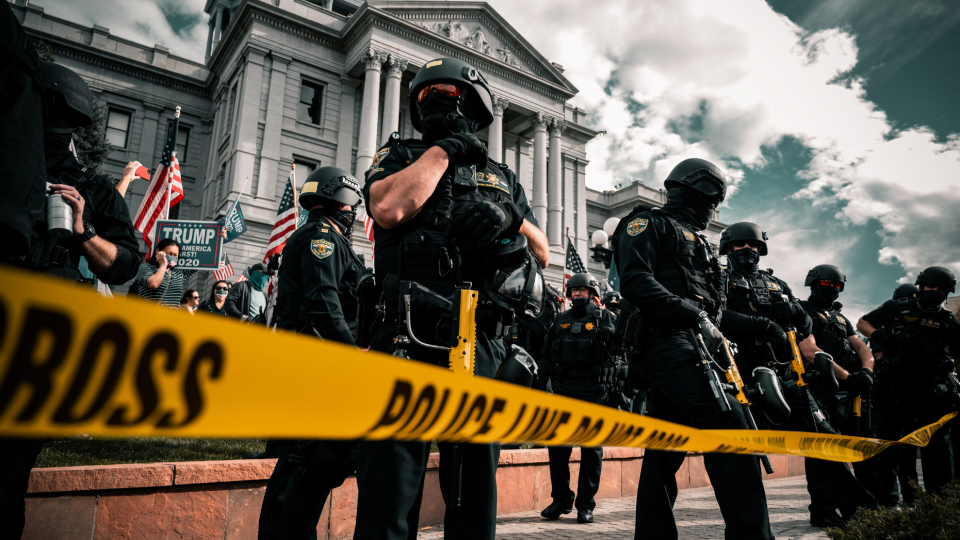By: Dr. Tracie L. Keesee, Co-founder, President, and COO and Dr. Kim Shayo Buchanan, Senior Research Scholar
The January 6 Committee's Final Report tells a harrowing and deeply troubling story, at a time when the country is struggling to face hard truths that have too long been ignored—not least, the alarming entanglement between White supremacist organizations and the nation's law enforcement agencies.
Black, Brown, and Indigenous people in this country have long warned of this reality, but over the last two years, it has also been increasingly highlighted in U.S. media. In September 2022, a data leak revealed at least 373 active police officers and "an estimated 1,100 individuals who previously served in law enforcement" with ties to the Oath Keepers. That same month, a group of so-called "constitutional sheriffs" were reported to be joining forces with True The Vote, an election-denying extremist organization. In February 2021, reports revealed that at least thirty off-duty police officers were among the attackers at the Capitol, and dozens of on-duty officers were investigated or disciplined for helping the Capitol attackers. And worse: These examples are just the tip of the iceberg.
Far too many avowed White supremacists have sought and found work in law enforcement, and far too many see the two groups as natural allies: At a 2020 Black Lives Matter protest in New Mexico, an officer was recorded telling paramilitary gang members, “We’re all here for the same cause, man.” On January 6, even as insurrectionist violence sent 140 members of law enforcement to the hospital—one of whom died the following day, and four of whom died by suicide within seven months—insurrectionists told officers, “We’re on your side.” Several FBI agents outright refused assignments to investigate and arrest suspects in the insurrection because they sympathized with the insurrectionists. Law enforcement agencies in several states have even invited hate groups and paramilitary gangs to help them subdue anti-racist demonstrators.
If a group is dedicated to racist hate or advocates the overthrow of elected governments (or both), no law enforcement agency or officer should have anything to do with it. Racist and insurrectionist sympathies are neither a private matter nor are they benign. These officers’ White supremacy affects the way they do their jobs, actively undermines the safety of communities in which they serve, and, as January 6 demonstrated, threatens the safety of other officers. It is not enough to be horrified and disgusted every time these facts are once again brought to light; we have to do something about it.
In a 2021 report, CPE offered detailed, practical steps that police departments can and indeed must take to ensure that they do not become entangled with hate groups or paramilitary gangs, and are able to free themselves of any such entanglements that may already exist.
First, law enforcement agencies must begin to enforce their own rules. Police department policy manuals typically ban “conduct unbecoming,” and forbid officers from joining or associating with criminal gangs that “advocate the violation of any of the laws, statutes, or ordinances of federal, state, or local governments.” The word “gang” is often used as shorthand for a stereotyped notion of Black and Latino men as criminals, but White supremacist and paramilitary gangs routinely commit violent crimes, amass armories of illegal guns, and train their members to attack nonwhite people, as well as anyone they decide to call “Antifa.” And, as we've seen, they’ve tried to overthrow a duly elected government. Law enforcement agencies must use existing rules to identify, discipline, and remove officers who join, support, or advocate for such gangs.
Next, law enforcement agencies must update their policies to explicitly forbid employees from joining, supporting, or advocating for any hate group, paramilitary gang, or other criminal organization. To minimize disputes over technicalities—whether avowed White supremacists such as the Proud Boys are truly a “hate group,” or whether the Boogaloo Boys, sworn to foment a “race war,” truly intend to overthrow the government—departments must prohibit association with all such groups on the same terms that they prohibit joining any other gang.
Finally, law enforcement agencies must unequivocally declare which side they're on. In written policy and public comment, they must affirm their support for racial justice and constitutional democracy, and repudiate bias, bigotry, and discrimination of all kinds. Never again should White supremacists and insurrectionists imagine that police are their allies. This should have been obvious—but, until now, they’ve too often had reason to believe it. To turn the tide, police departments must say and show that insurrectionists and racists are unwelcome in their ranks.

